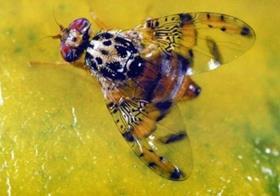
While the detection of Qfly could be a blow to the state’s fruit and vegetable trade, DAFWA researchers are trialling new technology to combat Medfly, which is now endemic in the state.
The ban on the use of certain chemicals, including fenthion, to combat fruit fly has led to what DAFWA horticulture director David Windsor has described as a renewed interest in innovative solutions to managing fruit fly.
The trial involves importing Medfly eggs from UK company Oxitec, which have then been reared at a department facility.
“The laboratory trials will determine whether the Oxitec fruit flies can be reared successfully and cost-effectively and if the males are compatible mates with the pest females,” Windsor said.
The trial has been described as similar to the already used sterile insect technique (SIT) that makes male flies sterile using radiation.
“The Oxitec technology is based on the SIT approach which we already use in WA, but instead of using radiation to render the male flies sterile, the fly is genetically modified to include a self-limiting gene,” he said. “When the male flies mate, they pass on this gene to their female offspring so they do not reach maturity or lay eggs in the fruit, dramatically reducing the next generation of Medfly.
“Because these males are not exposed to radiation, it is expected they will be more competitive and active at mating than their male SIT-counterparts.”
The research is being funded by Horticulture Innovation Australia (Hort Innovation).
“This Oxitec technology is an example of one of many potential novel tools that need to be explored in a considered manner,” Hort Innovation CEO John Lloyd said. “In line with Hort Innovation’s position on any novel technologies, there will be an evidence-based process employed examining the research literature, credible peer reviewed data, in order to reach a sound conclusion. This needs to be done within the current regulatory framework.”



